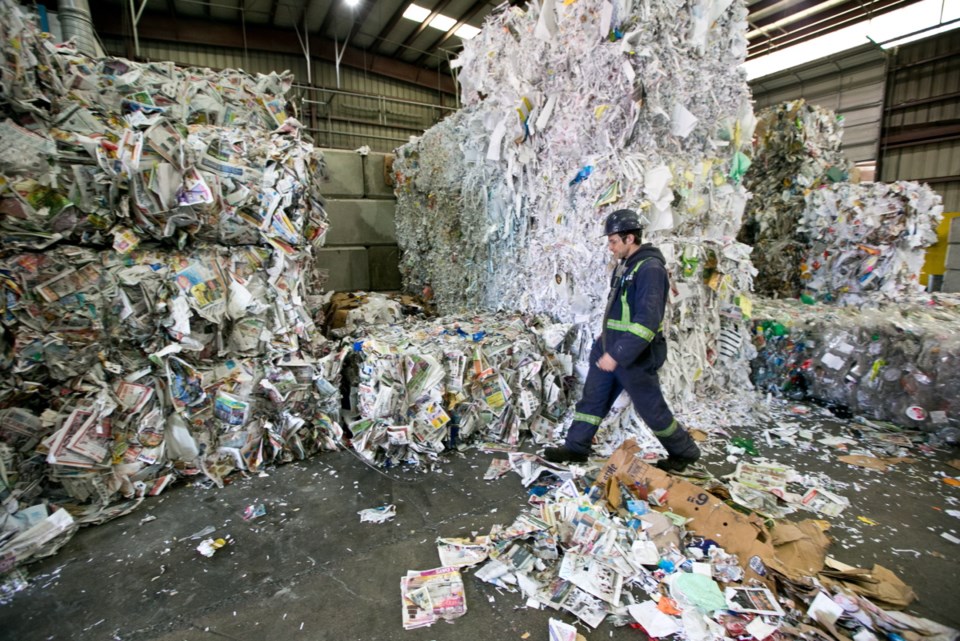The future of recycling in the province just got a little less murky, following the announcement that a coalition of existing recycling businesses will manage post-collection systems.
Green by Nature — a new organization comprising Emterra Environmental, Cascades Recovery and Merlin Plastics — won a contract to process and market an estimated 185,000 tonnes of packaging and printed paper material after it has been collected from curbsides, multi-family buildings and depots across the province.
Curbside collection across much of the province will change May 19, when industry group Multi-Material B.C., which awarded the contract to Green by Nature, takes over responsibility for managing residential recycling of packaging and printed paper and begins delivering services to about 1.25 million households in B.C.
For residents served by Capital Regional District, which already uses Emterra, Cascades and Merlin, it means few immediate changes. Glass will need to be sorted into separate containers starting in May, and new types of materials may be accepted for recycling in the future.
“It gives us comfort that we know and have a good working relationship with members of that team,” said Russ Smith, the CRD’s senior manager for environmental resource management. “And we’re pleased that recyclables will very likely be processed within the region.”
Green by Nature has promised to invest $32 million to build two new facilities: a material-recovery facility in Nanaimo that will sort and prepare collected material for shipment to processors and end markets, and a container-recycling facility in the Lower Mainland.
“This puts MMBC in a good position not only now, but in the future to be able to meet the changing needs as packaging continues to evolve,” said managing director Allen Langdon.
The implementation of Multi-Material B.C.’s plan follows a 2011 amendment to the B.C. Recycling Regulation, which shifted responsibility for recycling those materials from governments to the businesses that produce them. In addition to changing the way materials are collected, the program will also charge businesses a fee for the materials they produce and put into the marketplace.
Critics say that while the recycling regulation was well-intentioned, it’s bad news for local businesses and consumers.
Mike Klassen, director of provincial affairs for British Columbia with the Canadian Federation of Independent Businesses, used local newspapers as an example. Under the new regulation, members of the already strained industry are required to pay extra fees to cover recycling the printed paper it produces.
“For the newspaper industry, it’s a dark cloud,” Klassen said. “We know how much our local community papers are struggling — expect more of them to close.”
The province’s major newspapers, including the Times Colonist, have opted out of Multi-Material B.C. membership, Langdon said. But they are still required to pay fees by the province’s recycling regulation.
Langdon guessed that newspapers would have to pay about 20 cents per kilogram of printed paper produced.
“B.C. would be the only place in the world that is proposing cash fees for newspapers,” said John Hinds, president and CEO of the Canadian Newspaper Association.
Klassen said small businesses that have joined Multi-Material B.C. are also in trouble. An organization like Multi-Material B.C. — with a board dominated by representatives from multinational organizations like Proctor & Gamble, Coca-Cola and Walmart — doesn’t have the interests of the province’s small businesses at heart, he said.
“They have their own bottom line to think about,” he said.
In many cases, the businesses that sell products are telling local producers that they won’t accept any price increases, so those producers are forced to swallow the cost, Klassen said. That could be hundreds or thousands of dollars per month.
“What we’re hearing from business owners is anxiety and frustration. There will be jobs lost, and potentially businesses will have to close because of this new program,” Klassen said.
In other cases, the cost of recycling will be passed on to consumers, he said.
“If you like to shop or eat in B.C., get ready to get walloped by hidden taxes,” he said.
Environment Minister Mary Polak announced an exemption for small businesses on Feb. 4, acknowledging that the rollout of the program has not been smooth. Businesses that make less than $1 million in annual revenues, produce less than one tonne of packaging and printed paper supplied to B.C. consumers, or operate as a single point of retail sale and are not supplied by or operated as part of a franchise or chain, do not have to pay the fees.
Klassen said it’s an incentive that discourages growth. “Essentially, they’ve created a limit which a business owner will no longer want to go over,” he said.
Will Burrows, executive director of the Coast Waste Management Association, called extended producer responsibility a positive thing. “The user pays, not the taxpayer,” he said.
Burrows said he’s pleased to see the post-collection manager announced.
“We’re happy that another piece of the puzzle has been put in place. There’s a lot of turmoil in the industry at the moment as people are looking to accept the changes that are taking place and adapt accordingly.”
Changes coming to blue-box collection
• The current curbside recycling contract and schedule continue until May 31. The Capital Regional District board has approved an 11-month program extension that will start June 1 and go to April 30, 2015, and includes minor changes.
• New recycling schedules will be available for residents in May and can be downloaded and printed from the CRD website, where residents will have an option of signing up to receive reminders by text message, email, voicemail or Twitter and/or request that a schedule be mailed to them.
• Glass is not included in the new MMBC program. The CRD will still accept glass during the 11-month contract extension but it will need to be placed in a separate container.
— Source: CRD



